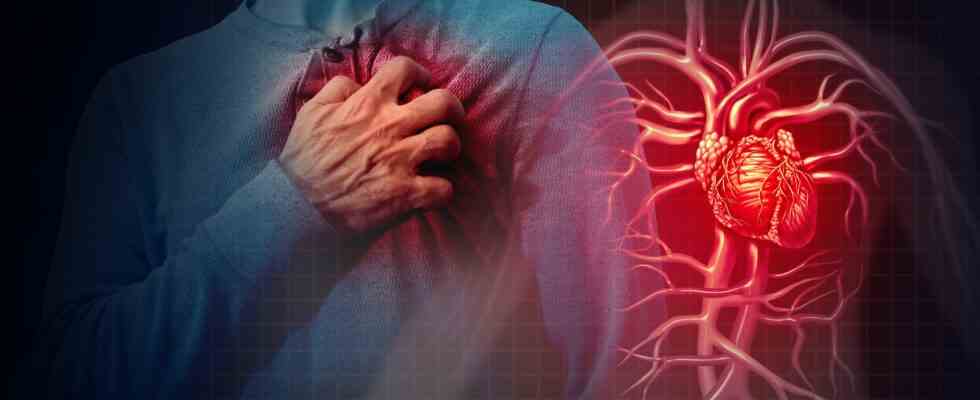Risk of sudden cardiac death recognizable from cardiac metabolism
At a sudden cardiac death heart stops beating within seconds without warning. Due to the sudden occurrence of such an incident, it has so far been difficult to predict. An American research team has now discovered a method that Risk of life-threatening cardiac arrhythmias based on heart metabolism can be predicted.
researchers of Johns Hopkins University School of Medicine (USA) have found that a abnormal heart metabolism with one up to three times higher risk of life-threatening arrhythmias and sudden cardiac death connected is. Cardiac metabolism can be checked using an MRI. The results were recently published in the journal “JCI Insight” presents.
When the heart suddenly stops beating
Sudden cardiac death occurs when the heart stops beating within a few seconds and blood pressure drops to zero. This can also happen to people who were supposedly healthy the day before.
Around 66,000 people in Germany die of sudden cardiac death every year. The causes of such a cardiovascular incident can be of different nature. Often there is one coronary artery disease (CHD) perish.
First method to predict sudden cardiac death
“We believe this is the first time that abnormal heart metabolism has been associated with an increased risk of life-threatening cardiac arrhythmias or sudden cardiac death in humans.”explains study lead author professor dr Robert Weiss.
According to him, the findings open up a completely new approach to Prevention and treatment of severe cardiac arrhythmiaswhich currently does not exist in cardiology.
Sudden cardiac death is responsible for every second cardiovascular death
According to the American Heart Association is the Sudden cardiac death accounts for around 50 percent of all cardiovascular deaths responsible in the United States. In the United States, more than 300,000 people die from sudden cardiac death every year.
Implanted defibrillators can protect against cardiac death
The primary means of preventing sudden cardiac death in high-risk individuals is an implantable one Cardioverter Defibrillator (ICD). The device, placed in the chest, continuously monitors the heart’s rhythm and delivers electric shocks when needed to restore a regular heart rhythm.
“Over a seven-year period, 60 to 70 percent of these devices never discharge to save a life”adds first author of the study dr T Jake Samuel.
However, the use of defibrillators is associated with a certain risk and with enormous costs. The research team therefore emphasizes that there is a great need for new and non-invasive approaches to better assess who really needs an ICD and who doesn’t.
How does the new approach work
As part of the study, the Johns Hopkins University working group submitted the salary Adenosine triphosphate (ATP) in the hearts of 46 participants cardiac insufficiency measured. ATP is the cells’ primary chemical energy source.
The researchers determined the ATP levels using a clinical magnetic resonance imaging (MRI) scanner. The procedure was refined by a method called magnetic resonance spectroscopy (MRS).
In this way, the team was able to determine which patients ATP metabolism disturbed was. The participants were monitored over an average period of ten years. An examination took place every three to six months.
Analysis of the data shows that participants with a low ATP levels in the heart a three times the risk of sudden cardiac death than people with normal ATP levels.
80 percent did not require an ICD
“About 80 percent of people with normal cardiac ATP levels never needed an ICD over the 10-year period of the study.”, concludes Samuel. The results could help better identify people who need an ICD. However, the findings would have to be checked on a larger group beforehand.
Risk of sudden cardiac death better assessed
“We are excited by these truly new findings, which are believed to be the first in humans, and believe they can transform the way physicians assess risk of sudden cardiac death.”sums up Professor Weiss.
Drugs to protect against sudden cardiac death
“Once we have confirmed that there is a link between metabolism and sudden cardiac death, we want to investigate which drugs maintain and improve ATP metabolism and whether they can reduce the risk of sudden cardiac death”, the research leader discusses the next steps. (vb)
Author and source information
This text corresponds to the requirements of medical specialist literature, medical guidelines and current studies and has been checked by medical professionals.
Author:
Graduate editor (FH) Volker Blasek
Sources:
- Johns Hopkins University School of Medicine: Abnormal Heart Metabolism May Predict Future Sudden Cardiac Death (published: 07/11/2022), hopkinsmedicine.org
- T. Jake Samuel, Shenghan Lai, Michael Schär, et al.: Myocardial ATP depletion detected noninvasively predicts sudden cardiac death risk in patients with heart failure; in: JCI Insight (2022), insight.jci.org
- German Heart Foundation: All facts about sudden cardiac death (accessed: July 12, 2022), herzstiftung.de
Important NOTE:
This article contains general advice only and should not be used for self-diagnosis or treatment. He can not substitute a visit at the doctor.

